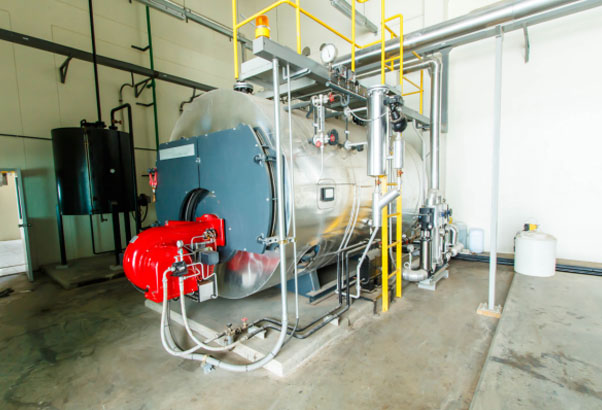Boiler Water Chemicals
- Scale and corrosion control
- Scale conditioner
- Dispersants
- Condensate line Corrosion control
- Oxygen scavenger

Thermax's extensive range of traditional and technically advanced boiler water treatment chemicals have been specifically developed to be used across various process and industrial boiler treatment applications. Thermax's superior quality boiler products and specialist additives focus on improving the operational efficiency of steam boilers, industrial boilers and process systems by offering ready-made solutions to the problems associated with such installations, namely scale formation, corrosion, boiler water carryover and sludge deposition.
Thermax's range of chemical treatments includes traditional and novel oxygen scavengers, scale and corrosion inhibitors, condensate line treatments, pH adjusters, antifoams and sludge control agents.
Oxygen scavenger
Oxygen scavenging means preventing oxygen from introducing oxidation reactions. Most of the naturally occurring organics have a slightly negative charge. Due to that, they can absorb oxygen molecules because these carry a somewhat positive charge to prevent oxidation reactions from taking place in water and other liquids.
Oxygen scavengers include volatile products, such as hydrazine (N2H4) or other organic products like carbohydrate, hydroquinone, diethyl hydroxy ethanol, methyl ethyl ketoxime, but also non-volatile salts, such as sodium sulphite (Na2SO3) and other inorganic compounds, or derivatives thereof. The salts often contain catalyzing compounds to increase the reaction rate with dissolved oxygen, such as cobalt chloride.
Corrosion Inhibitors
Corrosion is a general term that indicates the conversion of a metal into a soluble compound.
Corrosion can lead to failure of critical parts of boiler systems, deposition of corrosion products in critical heat exchange areas, and overall efficiency loss.
That is why corrosion inhibitors are often applied. Inhibitors are chemicals that react with a metallic surface, giving the character a certain level of protection. Inhibitors often work by adsorbing themselves on the metallic exterior, protecting the metallic surface by forming a film.
Scale Inhibitors
Scale is the residue that forms on surfaces in contact with water due to the precipitation of normally soluble solids that become insoluble as temperature increases. Some scale examples are calcium carbonate, calcium sulphate, and calcium silicate.
Scale inhibitors are surface-active negatively charged polymers. As minerals exceed their solubility and begin to merge, the polymers become attached. The structure for crystallisation is disrupted, and scale formation is prevented. The particles of scale combined with the inhibitor will then be dispersed and suspended.
pH conditioners
During water treatment, pH adjustments may also be required. The pH is brought up or down by adding basics or acids. An example of lowering the pH is the addition of hydrogen chloride in the case of a basic liquid.
The pH will be converted to approximately seven to seven and a half after the addition of specific concentrations of acids or basics. The concentration of the substance and the kind of substance that is added depend upon the necessary decrease or increase of the pH.
Sludge control agents
During the operation of a steam boiler, small quantities of hardness salts are introduced, together with traces of suspended matter, into the feed water. Over time the concentrations of these salts and suspended matter build up in the form of a 'sludge', and if not treated properly, can settle on to heat transfer surfaces, eventually 'baking' to form a hard crystalline scale.
Certain water treatment chemicals, phosphates, for example, if added incorrectly, could also precipitate and add to this scaling problem. To avoid such situations, consideration should be given to the use of polymer-based boiler water sludge conditioners to prevent the suspended solids from settling and 'baking' onto important boiler system surfaces. Polymer conditioners keep the unwanted matter (sludge) in solution, which can then be removed via the boiler blowdown.
Know More

